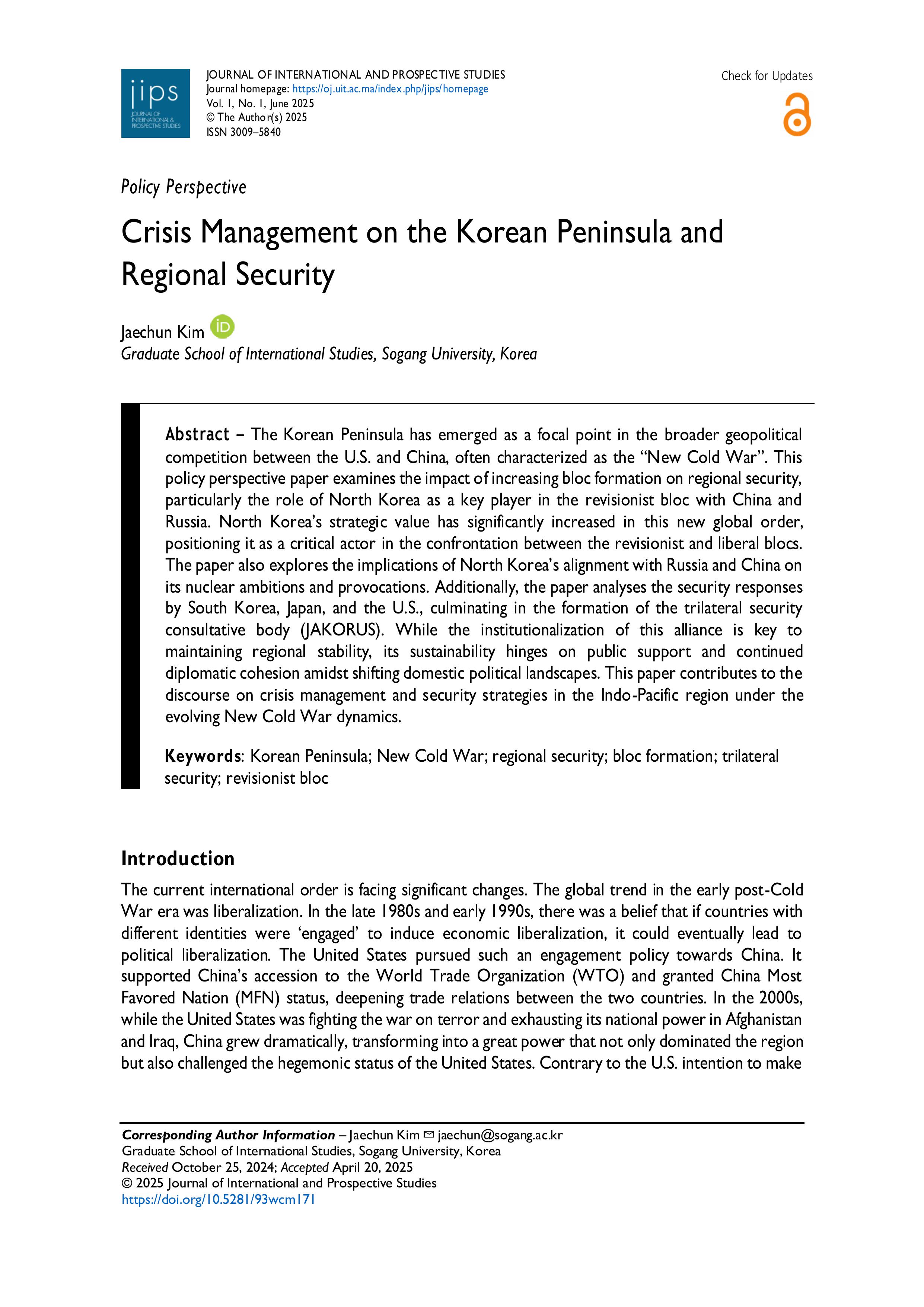Crisis Management on the Korean Peninsula and Regional Security
DOI:
https://doi.org/10.5281/93wcm171Keywords:
Korean Peninsula, New Cold War, regional security, bloc formation, trilateral security, revisionist blocAbstract
The Korean Peninsula has emerged as a focal point in the broader geopolitical competition between the U.S. and China, often characterized as the “New Cold War”. This policy perspective paper examines the impact of increasing bloc formation on regional security, particularly the role of North Korea as a key player in the revisionist bloc with China and Russia. North Korea’s strategic value has significantly increased in this new global order, positioning it as a critical actor in the confrontation between the revisionist and liberal blocs. The paper also explores the implications of North Korea’s alignment with Russia and China on its nuclear ambitions and provocations. Additionally, the paper analyses the security responses by South Korea, Japan, and the U.S., culminating in the formation of the trilateral security consultative body (JAKORUS). While the institutionalization of this alliance is key to maintaining regional stability, its sustainability hinges on public support and continued diplomatic cohesion amidst shifting domestic political landscapes. This paper contributes to the discourse on crisis management and security strategies in the Indo-Pacific region under the evolving New Cold War dynamics.
References
Campos, R. G., Heid, B., & Timini, J. (2024). The economic consequences of geopolitical fragmentation: Evidence from the Cold War [Working paper]. Banco de España & arXiv.
CBS News. (2024, June 19). Putin-Kim Jong Un summit sees North Korean and Russian leaders cement ties in an anti-U.S. show of solidarity. https://www.cbsnews.com/news/putin-kim-jong-un-meeting-north-korea-russia-anti-us-solidarity-ukraine-war
Cull, N. J. (2008). The Cold War and the United States Information Agency: American propaganda and public diplomacy, 1945–1989. Cambridge University Press.
Friedberg, A. L. (2023). A world of blocs. Center for Strategic and International Studies. https://www.csis.org/analysis/world-blocs
Fukuyama, F. (1992). The end of history and the last man. Free Press.
Global Times. (2024, February 4). Xi meets Putin, stressing strategic coordination to better tackle external interference. https://www.globaltimes.cn/page/202202/1251396.shtml
Goddard, S. E. (2023). Embedded revisionism: Networks, institutions, and challenges to world order. International Organization, 77(4), 663–693. https://doi.org/10.1017/S0020818323000279
Jones, S. G. (2022). Three dangerous men: Russia, China, Iran and the rise of irregular warfare. W. W. Norton.
Kroenig, M. (2020). The return of great power rivalry: Democracy vs. autocracy from the ancient world to the U.S. and China. Oxford University Press.
Kupchan, C. A. (2022). Multipolarity and the future of global order [Discussion paper]. Council on Foreign Relations. https://www.cfr.org/report/multipolarity-and-future-global-order
Lake, D. A., & Morgan, P. M. (Eds.). (1997). Regional orders: Building security in a new world. Pennsylvania State University Press.
Leoni, Z. (2024). Back to bloc politics? From the Cold War to the new type of Cold War. In A new Cold War: US–China relations in the twenty-first century (pp. xx–xx). Bristol University Press.
Mearsheimer, J. J. (2019). Bound to fail: The rise and fall of the liberal international order. International Security, 43(4), 7–50. https://doi.org/10.1162/isec_a_00342
Mearsheimer, J. J. (2021, October 19). The inevitable rivalry: America, China, and the tragedy of great-power politics. Foreign Affairs. https://www.foreignaffairs.com/articles/china/2021-10-19/inevitable-rivalry-cold-war
Pisciotta, B. (2023). Regional and global revisionism: Russia and China in a comparative perspective. The International Spectator, 58(2), 120–136. https://doi.org/10.1080/03932729.2023.2194161
Schweller, R. L. (1994). Bandwagoning for profit: Bringing the revisionist state back in. International Security, 19(1), 72–107. https://doi.org/10.2307/2539149
Sterling-Folker, J. (2017). Revisionism in international relations. In O. Fioretos, T. G. Falleti, & A. Sheingate (Eds.), The Oxford research encyclopedia of politics. Oxford University Press. https://doi.org/10.1093/acrefore/9780190228637.013.495
The Korea Times. (2024, May 16). Russia, China oppose 'military intimidation' against N. Korea by U.S., allies: Report. https://www.koreatimes.co.kr/world/20240516/russia-china-oppose-military-intimidation-against-n-korea-by-us-allies-report
Walt, S. M. (1981). Alliances in a unipolar world [Unpublished manuscript]. Harvard University.

Downloads
Published
Issue
Section
License
Copyright (c) 2025 Jaechun Kim (Author)

This work is licensed under a Creative Commons Attribution-NonCommercial 4.0 International License.

